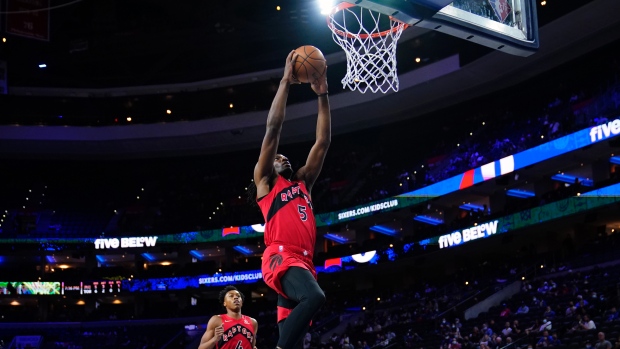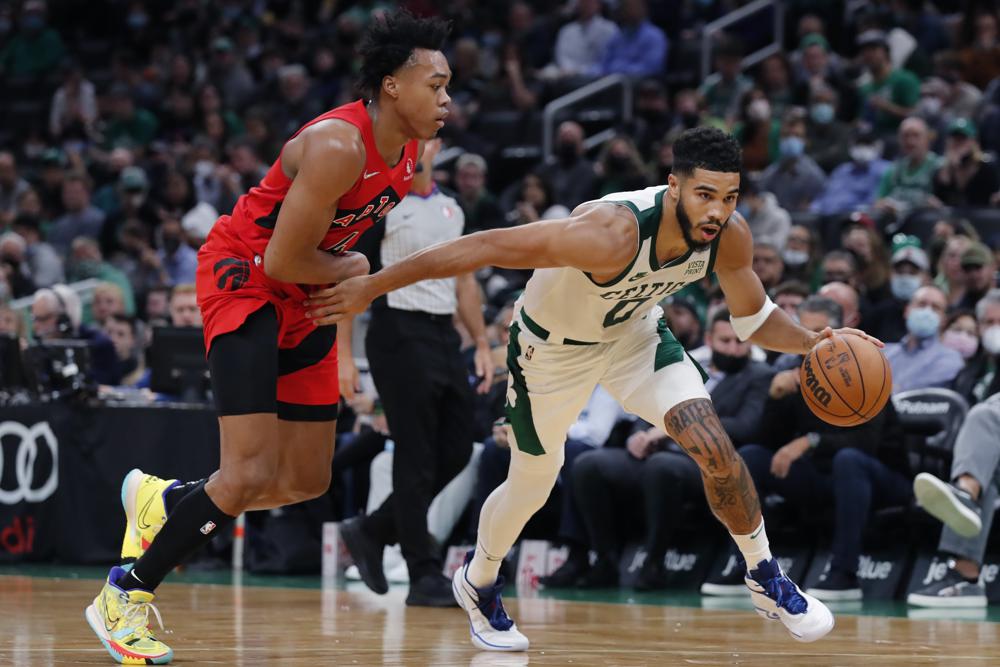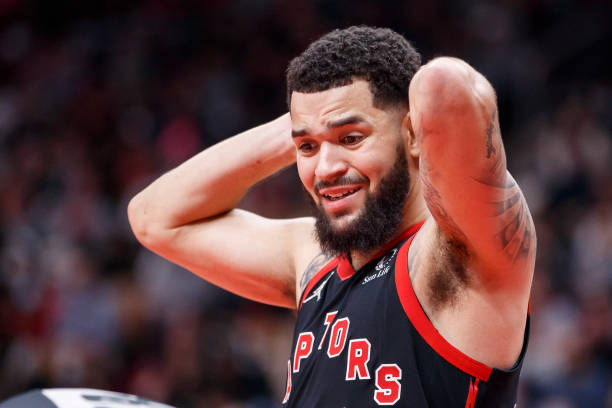Like a musician’s last album or an author’s last book, Precious Achiuwa will always have unfair expectations from Toronto Raptors’ fans. It’s not his fault that he was the primary acquisition from the team’s trading Kyle Lowry to the Miami Heat. But Lowry is the greatest Raptor of all time, and Achiuwa will always be connected to him in that sense.
It seemed at first like Achiuwa may not exactly live up to his namesake, but at the bare minimum he was worth having. He had a brilliant preseason, creating for himself with ease. He was solid through most of October, shooting modestly from the field, but playing good defense and slotting in as Toronto’s best rebounder.
Then it all seemed to fall apart.
From October 30 to November 11, Precious Achiuwa’s good start to the season started to slip away. He looked lost on the offensive end, hesitating whenever he touched the ball, often seeming to shoot or drive because he didn’t know what else to do. Despite being a center, he had the lowest field goal percentage in the league among players with six or more attempts a game over that stretch. Even though the team went 4-3 over that stretch, Achiuwa had the lowest net rating on the team, as the offense struggled and the defense collapsed when he played.
Achiuwa is only 22 years old, so of course it’s unfair to judge him too harshly if the team on which he’s starting is winning games. He played a measly 737 minutes last season with the Heat, much of that in garbage time, so he was (and still is) only in the process of finding his sea legs in the NBA. It’s particularly hard for a player to do that alongside established veterans like Fred VanVleet, who are incredible players, but who have high expectations of institutional knowledge for their teammates on the floor.
But the contrast between experienced players with shared schemas and one without was striking. Then Achiuwa hit the injured list with shoulder tendinitis, and the Raptors proceeded to struggle mightily without him. They went 0-3 in their next three games, and the center position seemed extremely thin; the Raptors gave up nine offensive rebounds in a loss to the Detroit Pistons, as well as 127 points, as they were unable to protect the rim. That became seven offensive rebounds and 118 points to the Portland Trail Blazers and then 10 offensive rebounds and 119 points to the Utah Jazz.
The Raptors were damned with Achiuwa and damned without him, in a sense. Then he returned, and the entire context of the conversation around his impact changed.
Since rejoining the roster, Achiuwa first came off the bench before rejoining the starting lineup in his third game back, against the Memphis Grizzlies. In those three games, he looked downright institutional in his ability to fit into what Toronto wants to do.
When the team’s defense is functioning well, Achiuwa has more often than not been the anchor. He has the second-best defensive on/offs on the entire team, behind only Fred VanVleet. On the other end, he’s fitting in better without wasting possessions with unjustified shots. That’s easier to do off the bench, when his aggression is more helpful because he’s not alongside established scorers like Pascal Siakam. But even when Achiuwa is starting, he’s been better offensively. He’s set screens with much more contact, rather than slipping each and every time. He’s passed well. His eurostep is especially useful in transition. He’s shot jumpers without hesitation and even started making triples occasionally.
The obvious lesson for Toronto is that young players can be volatile. Indeed, since starring against Memphis, Achiuwa has had two pedestrian games, both Raptors losses with Achiuwa starting (and Khem Birch on the injured list). He looks out of place at times on the offensive end, and if teams ignore him, the offense is massively handicapped. He can solve that problem by making his jumpers, which doesn’t happen often. Or he can solve it by cutting and screening smartly, moving without the ball, but he isn’t yet a quick enough processor to consistently do that. Of course, his defense remains critical. But once again: young players can be volatile.
Frankly, if that lesson needs to be re-learned, then that’s not great. We should have known that before! But there are other important realizations to come out of Achiuwa’s performance this year. One is that it’s critical for teams to have a center available at all times, and when he was on the shelf, Toronto couldn’t hack it with just Birch in the lineup. It’s clear, whether looking at the games or the numbers, that Toronto is at its best with a center on the floor. Based on the whole season, Toronto’s second- and fourth-best on/off differentials per 100 possessions belong to Birch and Achiuwa, respectively.
But Achiuwa isn’t just a big body that can man the center position in a pinch. He actually has a number of skills about which Toronto should be salivating when trying to think about what type of player Achiuwa will be years down the road. But he isn’t just a piece developing for the future; he has been one of Toronto’s best defenders this season.
He doesn’t have an elite block rate, but he has been protecting the rim exceptionally — holding opponents to -12.8 percent lower than expected from within six feet, which is comparable to the current marks of proven rim protectors like Myles Turner or Giannis Antetokounmpo. By protecting the rim without jumping himself out of position for blocks, he’s been able to improve his defensive rebounding by leaps and bounds; the team allows 4.1 percent fewer offensive rebounds with Achiuwa playing versus him on the bench, which is a 85th-percentile mark leaguewide and the best on the Raptors.
Of course, sometimes Achiuwa is still able to clean up the mess by rising up and meeting opponents above the rim.
Achiuwa is mobile for a big, and he’s able to stay with many smaller players. He has quick hips and quick hands, and he isn’t shy about trying to rip the ball away from opponents on the ground.
That’s what makes him solid. What makes him incredible is his athleticism. Even though he’s not always in perfect position, he’s shown a knack for getting himself back in the play to disrupt what could otherwise be a sure thing.
Achiuwa isn’t yet a finished product. For as many games in which he’ll look seamless, he’ll likely have the same number or more in which he’ll look lost again, particularly on the offensive end. Improvement is never linear. And frankly, the team’s offense is hurt by his presence. But he’s shown that he can do what Toronto asks of him, if not consistently, and he should learn to cut better, screen harder, make crisper decisions. At the same time, the team is crippled defensively by his absence. And it’s important to note that the team asks a whole heck of a lot from the center position on that end. Achiuwa has to switch on to the perimeter, rotate around the floor without hesitation, guard pick and rolls, protect the rim, clean the glass, and know at every moment which of those tools is required not only in that moment but also in the next one. That’s hard! That he can do it more often than not, at 22 years old, in his first year with the Raptors, is unbelievable.
This season is about development most of all. Though Scottie Barnes, OG Anunoby, and VanVleet may be the most obvious players who have benefited from added responsibility this year, there are plenty of others taking steps forward. Achiuwa is one. For all his limitations on the court, Toronto is even more limited when he is off of it. He’s already a productive player, and he still has worlds of growth left in him. Maybe one day he’ll even live up to his expectations.



